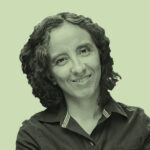In both English and Spanish, there is a good quantity of content for the visibility of the LGBTQ+ community.
Pride Month has been instituted as a reminder to make visible the life experiences and social imbalances faced by non-heteronormal groups. In 1999, U.S. President Bill Clinton, inspired by the events of Stonewall in the 70s, chose June to devote an entire month to necessary conversations on how to combat discrimination based on sexuality and gender identity.
Since its first celebration, the past two decades have seen significant progress in visibility, inclusion, and humanization of the LGBTQ+ community. In previous articles, we have commented both on these advances and significant problems related to the topic. However, there are still expansive content offerings that provide the opportunity to learn about the LGBTQ+ experience in informative, empathetic, and friendly ways. Below, we present six podcasts presenting life stories, viewpoints, and basic concepts for understanding the non-hetero community.
A great English-speaking offering
The United States and England have extensive content libraries produced by and for the LGBTQ+ community. The following programs touch on various topics with diverse perspectives in science, politics, history, sports, providing high-value testimonials that magnify the voices of people within the queer community.
Curiosity and queer education
Jonathan Van Ness’s activism has been crucial to opening up a new phase of social visibility and inclusion. One of his most valuable resources supporting this progress is his podcast Getting Curious.
The renowned author devotes an hour a week to offer space to experts on all kinds of topics, from ancient history through current politics to fundamental notions of science and even a little about the personal experiences of Van Ness and other community members.
In favor of diversity in sports
Worldwide, the competitive sports scene has not been gentle to non-heteronormal people. The BBC in England committed to improving the conversation about the treatment of LGBTQ+ athletes through a podcast.
The LGBT Sports Podcast invites an athlete each week to talk about their career and how their identity as a queer person intersects with their life in the sport. This program has shone a light not only on athletes with brilliant careers but also on people who have dedicated their lives to normalizing the presence of LGBTQ+ people in professional sports.
Towards diversity, one person at a time
Cameron Esposito is much better known for her work in the world of stand-up comedy. The usually explosive and notorious comedian has built a career talking about her life experiences. Esposito uses this approach to offer a window into the lives of non-heteronormal people in her podcast Queery.
With a calmer tone and cadence than usual, Esposito invites people from the LGBTQ+ community who make a living by exercising their art. Whether the stories are about a day in a singer’s life, the year a drag queen’s career came together, or a composer’s creative process, the sharing in this space motivates listening and enriches the understanding of the community not only as an integral part of society but as people.
Iberoamerica advancing
Spanish-speaking countries such as Mexico and Spain have come a long way in shining light and holding conversations to fight discrimination against diverse groups. However, the content produced in Spanish-speaking regions still does not offer a wide variety of topics compared to the United States and Europe. In this region, we are still in the awareness phase, so the podcasts below focus on raising awareness of LGBTQ+ and the fundamental issues of belonging to the LGBTQ+ community.
A podcast for all (“todes,” an inclusive all)
Produced by the Mexican Institute of Radio (IMER) in conjunction with the Sexual Diversity Circuit (Cidisex) and Todes magazine, the podcast Citizen Diversity is one of the most complete and serious presentations of the queer experience in Mexico.
Enrique Gómez, the host of the program, manages a short and friendly format in which he invites specialists to talk about topics of great educational value, such as the construction of personality, healthy masculinity, and self-esteem.
The teaching power of the anecdote
With an anecdotal and conversational approach, Juan José Vera Martín, or Juanjo as he likes to call himself in his podcast Mundo LGBT, continues a long activism effort promoting the humanization of the non-heteronormal community in Spain.
The podcast is a showcase to publicize the life stories, successes, and viewpoints so far of hundreds of people within the LGBTQ+ community. With singers, cartoonists, advisors, poets, and members of the military, among others, the podcast truly becomes a world of shared experiences.
Queer activism and education
A gay in Chile is a launchpad to make visible the experiences of non-heteronormal life and the professional trajectories and activism to which important figures in the Chilean community have dedicated themselves. Alonso Poblete conducts in-depth interviews for listening and learning about the lives of his guests and their work in areas such as politics, education, socio-environmentalism, journalism, music, and any topic intersecting with LGBTQ+ activism.
All of the podcasts in this article are available on Spotify. In addition, some have their own web pages for extra information on how they make their content and collaborate to advance an egalitarian society based on gender identity and sexual preference.
Have you listened to these podcasts? Are there others you would like to recommend? What do you think lacks in the realm of visibility and awareness of the rights of the LGBT community? Tell us in the comments.
Translation by Daniel Wetta.
This article from Observatory of the Institute for the Future of Education may be shared under the terms of the license CC BY-NC-SA 4.0 
)
)


)